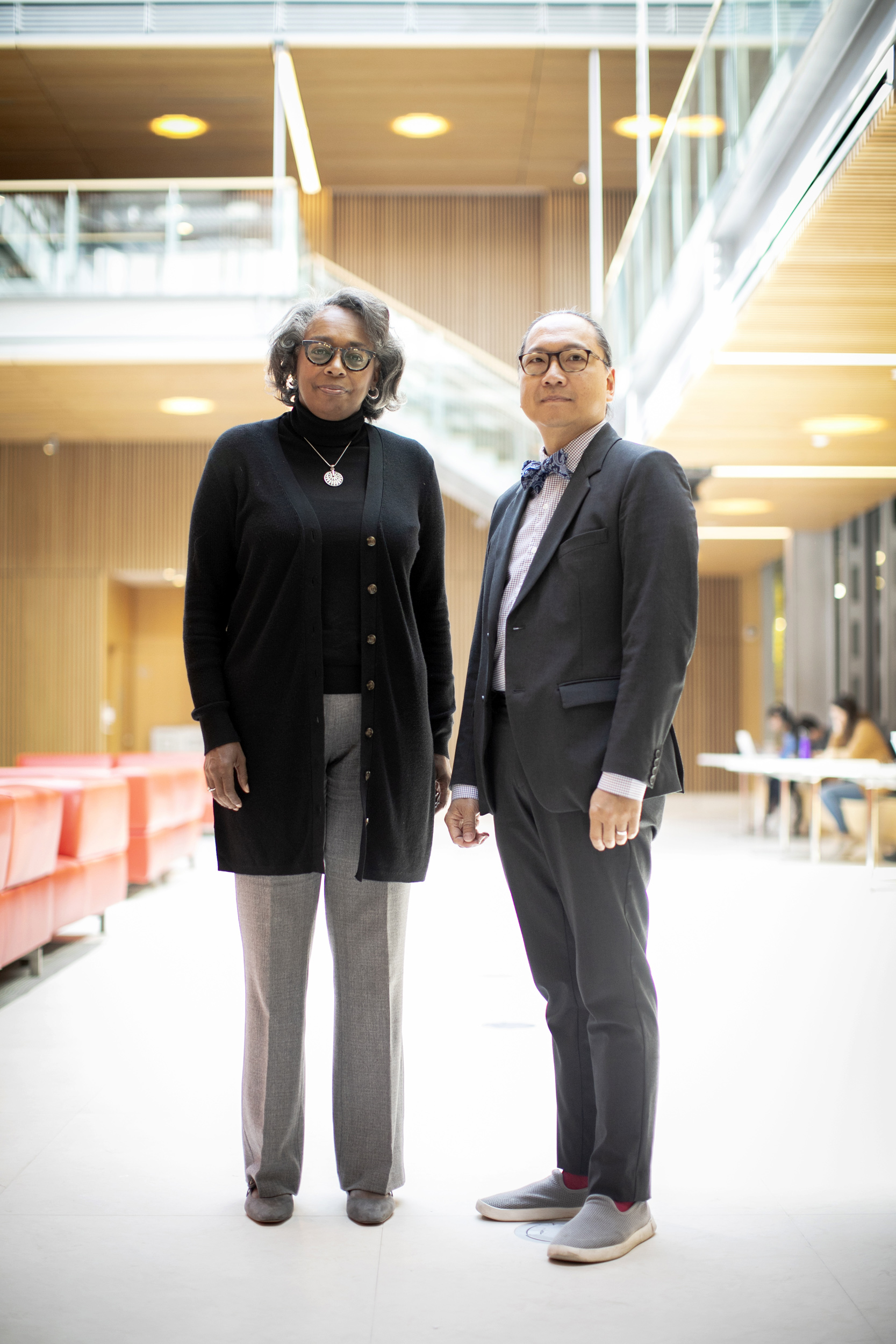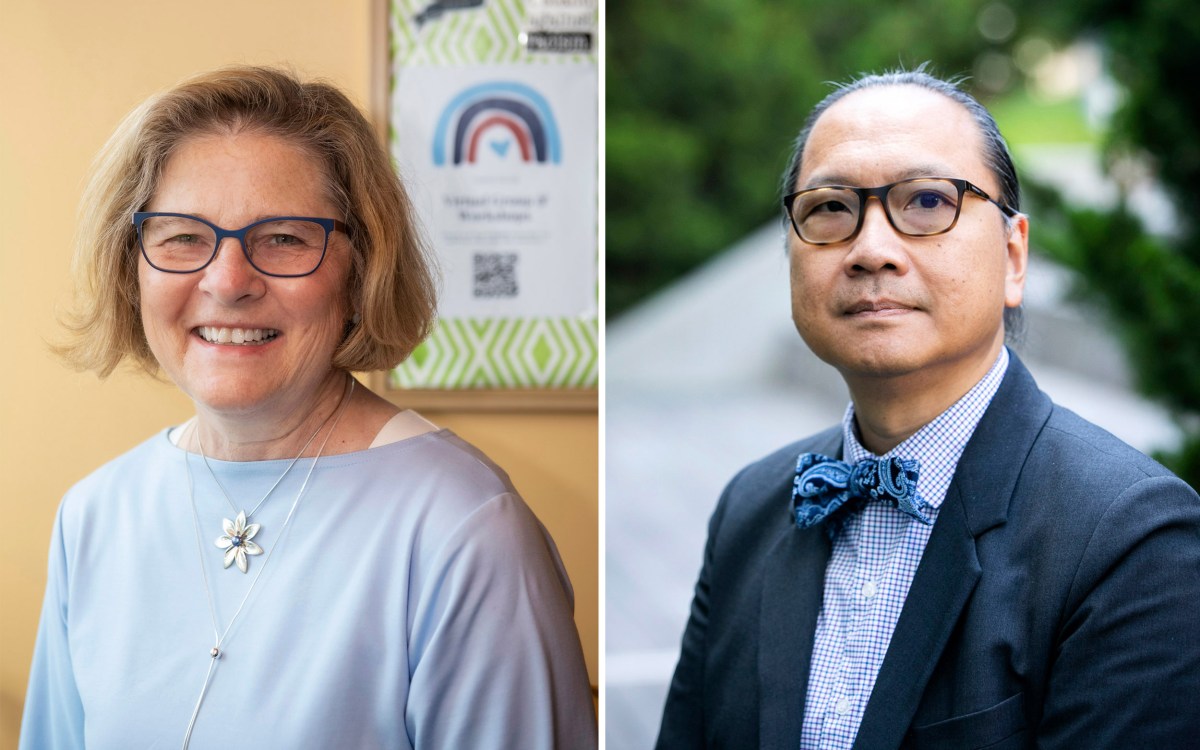‘Access, awareness, prevention, and support’
Harvard moves to implement Student Mental Health task force recommendations

Robin Glover (left) and Giang Nguyen are co-chairs of the Implementation Committee for Student Mental Health and Wellness.
Stephanie Mitchell/Harvard Staff Photographer
In an email to the Harvard community on Thursday, Provost Alan Garber shared updates on the work to implement recommendations from the Task Force on Managing Student Mental Health, including the We’re All Human campaign, a University-wide initiative to raise awareness of resources to help students prioritize their well-being and access programs, support, and care at Harvard.
To learn more about the campaign, the Gazette spoke with the co-chairs of the Implementation Committee for Student Mental Health and Wellness: Robin Glover, associate provost for student affairs, and Giang Nguyen, associate provost for campus health and well-being and executive director of Harvard University Health Services. The interview was edited for clarity and length.
Q&A
Robin Glover and Giang Nguyen
GAZETTE: In July of 2020, the provost’s office released the Report on the Task Force on Student Mental Health. Can you remind us what the takeaways were, and how they have driven work on the campaign that the community is going to see in the coming weeks and months?
GLOVER: Our work on this committee was guided from the beginning by that report, which gave us direct insights into the state of student mental health on campus and offered recommendations for us to act on. What stood out to me, based on feedback from students, were rising levels of anxiety disorders, depression, and loneliness. For the undergraduates, that included high levels of stress and measuring up to their peers, and for graduate students it was isolation, thinking about their academic careers, financial security, and their adviser relationships, which impact their academic and career prospects.
Those findings gave us a clear pathway to focus on four areas of well-being and mental health at Harvard that we knew would have the greatest impact: access, awareness, prevention, and support.
“… part of our effort is to encourage self-care and provide students with the tools to maintain good mental and physical health by helping them manage things like stress and anxiety with these resources.”
Robin Glover
GAZETTE: Provost Garber gave us a preview into what has been developed to support those four areas. What are those resources and what can students expect to see in the coming months?
NGUYEN: Access to mental health care services has been an area of great attention: the creation of an Access Team as a first point of contact for students reaching out to CAMHS for clinical care. This new team includes a group of licensed therapists, known as clinical access coordinators. When any student contacts CAMHS for support, these Access Team members will provide the initial evaluation of the student’s emotional state and then help determine what type of support that student needs; from there, the clinical access coordinators continue to engage with the student through the process of initiating care, whether that’s getting scheduled for a formal intake at CAMHS, getting urgent same-day services for their mental health, helping with referrals to community providers, or offering another CAMHS service, like workshops or groups.
We’ve also launched a new partnership with TimelyMD to deliver TimelyCare, which offers telehealth counseling services to every student covered by the student health fee (SHF) at Harvard, beginning this week. Any student covered by SHF who wants to be seen through telemedicine will have access to up to 12 TimelyCare sessions each academic year. Additionally, students who need psychiatric prescriptions will have the option to receive telemedicine care through a TimelyCare psychiatrist. This new service significantly multiplies opportunities that students have for mental health support and care because now they will be able to access counseling sessions free of charge via telehealth with TimelyCare or access traditional services through the office at CAMHS. And the 24/7 CAMHS Cares phone line remains an option for in-the-moment support from a licensed therapist.
GLOVER: Beyond CAMHS, we’re also providing the community with tools to help them when they are experiencing stress or anxiety, or when they need to help a friend, colleague, or student who is. For students, one of the resources we’ve rolled out is a learning module that offers self-care strategies, advice on when to seek help, tips for supporting a friend, and what resources are available for support.
There are separate modules for undergraduate and graduate students, whose student experiences are a little different, but the same principles apply, providing them with the tools to manage stress or anxiety. For graduate and professional students, it talks about managing the adviser-advisee relationship, and has a list of resources that they can use. All new and returning students will be encouraged to complete the module in the fall semester. There is also a learning module specifically for faculty and staff, which we will be making available later this month.
In addition to the learning modules, we’ve also built a quick reference guide, called the Crimson Folder, targeted to faculty and staff to help be a resource to students whom they recognize as being in distress or in need of support. Each School has developed their own Crimson Folder, tailored to the needs of their students specifically. It gives our faculty and staff common scenarios, guidelines in how to identify a student in minor or severe distress and provides them with options to direct students to the appropriate resource, all in one concise, School-specific document. Students will have access to that too if they have a peer who’s in distress and need to know where to turn.
All these things are going to be accessed at the new Student wellbeing at Harvard website, alongside all the other resources at Harvard — including those available through places like Counseling and Mental Health Services, the Center for Wellness and Health Promotion, the Office for Equity, Diversity, Inclusion, and Belonging, Harvard University Disability Resources, the Office for Gender Equity, and others.
NGUYEN: The website is really going to be the central hub for the information that is being provided. One of the findings from the Task Force for Student Mental Health was that students often were not fully aware of what was available to them, even though there was a wealth of resources at the University and at their individual Schools. This centralized website is meant to address that very real concern, because at a time of need, students need to be able to find the services that they need.
“The work of culture change takes time, but we build culture collectively.”
Giang Nguyen
GAZETTE: Something underscored in the report is that this is long-term work and changing culture around mental health requires a sustained effort. Can you speak to the importance of that and how the University is planning to keep the effort going?
NGUYEN: I think incorporating well-being promotion into our everyday lives and into how we interact with each other on a day-to-day basis isn’t always automatic in the way we currently live our lives, on campus or anywhere right now. The work of culture change takes time, but we build culture collectively. One of the recommendations from the task force was to implement a University-wide public awareness campaign aimed at changing culture and raising awareness to help students prioritize their well-being and access care, when it’s needed. Responding to this recommendation, we have launched the We’re All Human campaign. This awareness campaign was developed with input from students, both undergraduate and graduate, and faculty and staff. It is meant to be a catalyst for Harvard to be the center of this culture change, that hopefully will spread well beyond this campus. Throughout this academic year, you will start seeing posters and programming as part of this campaign. It’s really targeted at helping folks truly build their own well-being into the way they live their lives while they are students here, and for when they go off into the world.
Importantly, going back to a point we discussed above, a key component of the We’re All Human campaign is that the campaign visuals — such as posters and table tents — will include a QR code. With the click of your phone or tablet this QR code will take you directly to the Student wellbeing at Harvard website to quickly connect our community members with resources and support, whether that’s tools to help you prioritize your well-being or if you need to quickly connect with CAMHS for more urgent mental health care.
GLOVER: It’s important that we keep talking about this. Not just as part of a campaign, but as part of a discussion when we’re meeting with students or even when we’re talking to a colleague, and not feeling uncomfortable to talk about our mental health. As the name of the campaign says, we’re all human beings, and we all have these emotions, moments of insecurity or stress or anxiety, and sometimes it’s a little bit of baggage. We must be able to at least have a conversation about it, and I think we need to feel comfortable doing that, and hopefully the campaign gets the conversation started.
NGUYEN: This initial campaign is a yearlong effort, but it will be refreshed in subsequent years, because it’s important for us to not consider this a one-time event.
GAZETTE: A big part of this campaign is recognizing that it’s not just important to be aware of well-being when someone is in distress, it’s equally important to be mindful of your well-being on a daily basis. Why is that important for people on campus, and what is the University doing to support the community in doing that?
GLOVER: Well-being is very important, and so is maintaining good mental and physical health. When we’re stressed and we have anxiety, it impacts all aspects of our lives — work, school, everything. So, part of our effort is to encourage self-care and provide students with the tools to maintain good mental and physical health by helping them manage things like stress and anxiety with these resources.
NGUYEN: Physical well-being, as Robin mentioned, plays an important role in keeping our minds well, and other factors of our well-being, like social and relational well-being, spiritual well-being and our sense of purpose, and the ability to find joy in our own intellectual and vocational endeavors. All these things contribute to the well-being that we feel and the emotions that we experience.
Part of our humanity is our ability to feel human emotions and, sometimes, to feel them very deeply. The human experience includes connecting with each other and building community, all of which are important components of the campaign, and what we’re trying to help our community in achieving.





